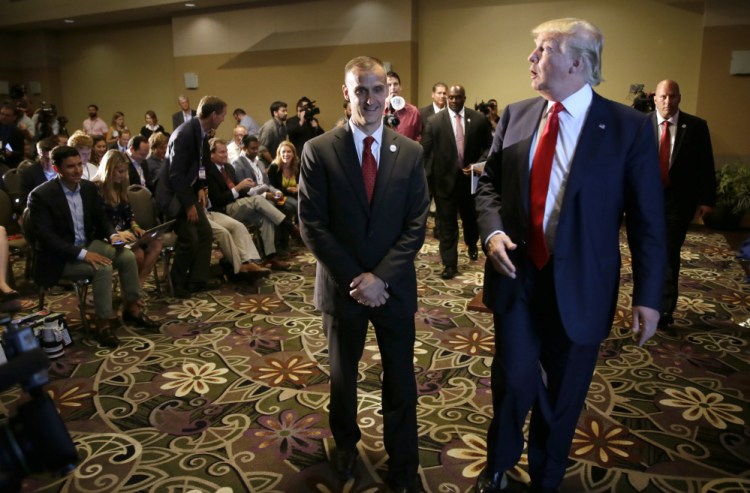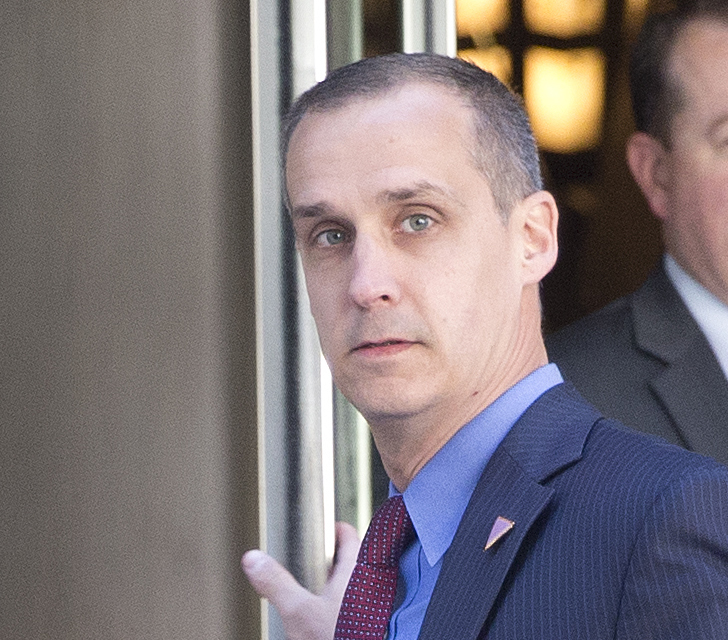NEW YORK – Corey Lewandowski, dismissed Monday as Donald Trump’s campaign manager, had risen from political obscurity to oversee the celebrity businessman’s rise to the brink of the Republican nomination, but he also became a flashpoint for campaign in-fighting.
Lewandowski was a little-known New Hampshire operative when Trump hired him at first sight early last year to run his as yet-unannounced campaign. Lewandowski, a close-cropped, sharp-elbowed figure, was the most fervid believer in the strategy to “Let Trump be Trump,” unleashing the businessman to upend the Republican primaries by using his larger-than-life personality to summon raucous rallies and dominate media attention.
But Lewandowski generated the wrong kind of headlines in March when he was charged with misdemeanor battery for an altercation involving a female reporter after a news conference in Florida. The charges were later dropped.
Soon after that, Trump brought in Paul Manafort, a veteran Republican national operative, and relations between his more seasoned group and the rag-tag original campaign staff grew toxic, with both camps sniping at each other in closed-door meetings and in the press.
Lewandowski’s dismissal comes less than a month until what would have been his greatest political triumph: Trump’s acceptance of the Republican presidential nominee at the party’s national convention in Cleveland.
“A lot of us have been here from the very beginning when the professional pundits said this was a career-ender and we weren’t going anywhere,” he said in May. “We’ve done something no one thought could be done.”
Reached Monday, he said only that Manafort “has been in operational control of the campaign since April 7.” He declined to elaborate on his dismissal.
Lewandowski’s path to Trump Tower was an unlikely one. He grew up in the working-class former mill town of Lowell, Massachusetts, worked as an operative on Capitol Hill, graduated from the New Hampshire state police academy and took a job with Americans for Prosperity, the flagship conservative political organization of the billionaire industrialists Charles and David Koch.
He had no national campaign experience when he took the helm of the Trump campaign, a longshot bid dismissed by many as a celebrity’s vanity project. But the campaign soon surged, as Lewandowski and the candidate maintained focus on media and the rallies, keeping the staff lean and eschewing traditional campaign hallmarks like costly voter data efforts and advertising buys.
He accompanied Trump on the road, acting as much as a body man as campaign manager, and was seen as a gatekeeper for the candidate. Trump often spoke warmly of the campaign manager and steadfastly defended him after the arrest.
“I can’t destroy a man,” Trump said. “I can’t destroy him. He’s got a beautiful wife and children, and I’m not gonna destroy a man for that.”
Lewandowski’s plan to model the broader general election fight after the shoestring primary campaign drew skepticism from many Republicans. The campaign has largely outsourced its ground game to the Republican National Committee and was slow to increase its fundraising efforts. Lewandowski was reluctant to expand the staff.
As the clashes with Manafort became more frequent, many of Trump’s Republican allies and inner circle – including his adult children – believed a change in course was needed before a pitched national campaign against Hillary Clinton.
New Hampshire State Republican party officials say Lewandowski is still slated to serve as the state’s delegation chair to the Cleveland convention.
Send questions/comments to the editors.



